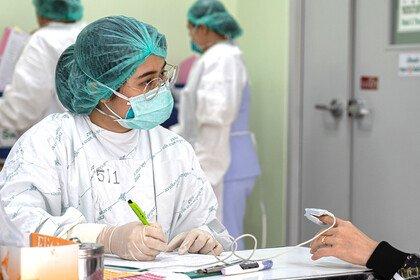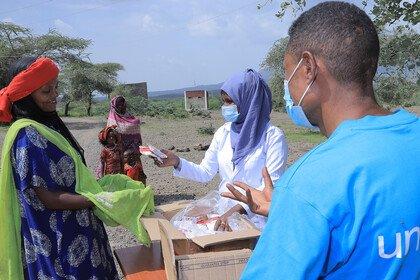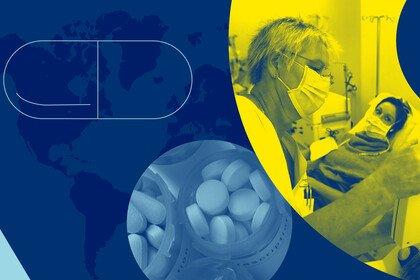
Science can give us the tools to end the pandemic, but it needs funding
Vaccines, tests and treatments, alongside well-equipped health systems, are the solutions to bringing the Covid-19 pandemic under control. But this won’t happen without urgent investment, explains Jeremy Farrar.

Ten months into the Covid-19 pandemic, we are still underestimating its real impact. Somehow, we still think it is going away, but it isn’t. Covid-19 is endemic, reverberating around the world.
Economies are bleeding money, jobs are being lost, futures are stolen due to lost educational opportunities, and mental health issues are rising. Yet, we continue to apply sticking plasters. As much of Europe enters lockdown again, other parts of the world will follow suit in the coming months. People everywhere are facing Covid-fatigue, and there are risks of increasing tension and social unrest.
The time for talking is over. If we don’t act now, there will be a longer, much tougher road ahead. Societies around the world can only take so much of this. We have to change our approach, we have to change the fundamentals of this epidemic. There is a way to do this, there is an exit strategy. It is through the ACT-Accelerator coordinated by the World Health Organization (WHO).
As the global economy loses trillions, there is still an urgent funding gap of $28.4 billion – of which, $4.5 billion is needed immediately to fast-track vaccines, tests and treatments and prepare health systems through March 2021. These upfront costs may seem high in normal times, but they are trivial compared with the damage being done.
This needs governments to engage their full weight to support the ACT-Accelerator, to get the world out of this. It would be the greatest financial investment ever made.
The time to act is now. It is time for leadership, leadership that will be remembered in 100 years’ time, as we remember now the leaders who made a difference in 1918.
The world is watching, the world knows these diagnostics, treatments and vaccines will come. The world will not forgive us if we do not make them available to everyone.
At the start of the Covid-19 pandemic we knew very little about the virus, even less how to diagnose, treat and prevent it. And we had no vaccine.
Since then, progress has been staggering – with money cobbled together almost on a day-to-day basis, we have light at the end of the tunnel. Science can deliver diagnostics and life-saving treatments, such as dexamethasone. Less than 20 days after dexamethasone was identified as a life-saving treatment, the ACT-Accelerator secured 3 million treatment courses for patients in low- and middle-income countries.
As with the Covid-19 vaccines, no single treatment will be a magic bullet. We need to invest in a portfolio of treatments, at scale and at risk, that can work across all stages of the disease, and different populations and settings.
Of the total funding of $6.6 billion needed for therapeutics through the end of 2021, $750 million is an immediate need to intensify efforts on monoclonal antibodies. Without it, this work will stop. The world will not have access. Science will have given us the tools, but we will not be able to make them available to society. I remember when that happened with HIV – we had the drugs, but we did not make them accessible and available. It was a public health and international disaster.
Great progress has been made, including by efforts such as the Bill & Melinda Gates Foundation who, as part of the COVID-19 Therapeutics Accelerator, have agreed to facilitate access to future Eli Lilly monoclonal antibody treatments in low-and middle-income countries.
The WHO, CEPI, GAVI, FIND, Global Fund, World Bank, Unitaid, the Bill & Melinda Gates Foundation and Wellcome have shown this can and is being done.
But it needs so much more. This is now a financial issue. Science and international partnership, coordinated by the WHO, have shown the way. Simply, money is now the barrier.
The world is watching, the world knows these diagnostics, treatments and vaccines will come. The world will not forgive us if we do not make them available to everyone.
This article is based on a statement given by Jeremy Farrar to members of the ACT-Accelerator Facilitation Council on 3 November 2020. The Council, formally launched in September, provides high-level political leadership to the ACT-Accelerator to ensure rapid development, scale-up and fair global distribution of Covid-19 vaccines, therapeutics and diagnostics. Wellcome is leading the therapeutics workstream, alongside Unitaid.


